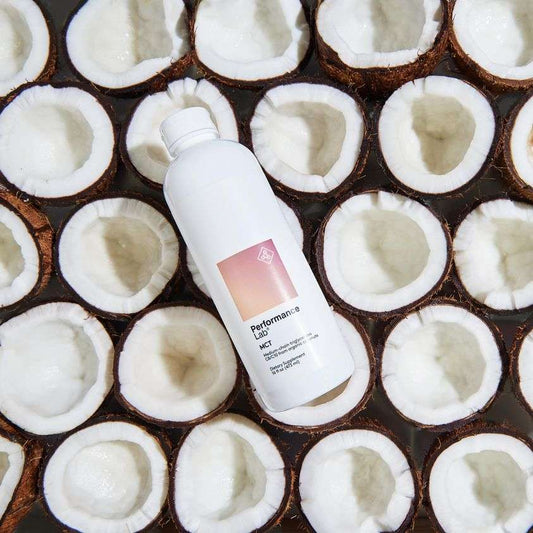We’ve talked about the insane craze of MCT in coffee and whether it’s a good idea to take MCT oil pre or post workout...
...but we haven’t really touched on the link between MCT and ketogenesis. And whether of not you can use MCT Oil if you're not following a keto diet.
Since the keto diet, and low-carb in general, blew into the nutrition scene as a great way to lose weight and regulate blood sugar, MCT has become a staple to the diet.
Whether you’re looking to burn fat or lose weight, fight insulin resistance, or starve off hunger when intermittent fasting, MCT oil seems to be able to do it all.
This article is going to break that down even further to help you understand that MCT isn’t just for those following the keto diet, but if you are, it’s a sure-fire thing to add in.
What is MCT Oil?
Medium-chain triglycerides, or MCT for short, is a type of triglyceride or fatty acid that’s common to certain food sources. Namely:
- coconut.
- palm oil.
- and some dairy products.
MCTs are usually present in conjunction with short-chain fatty acids and long-chain fatty acids in natural food sources, but 100% pure MCT is an oil extract from coconut or palm kernel oil through a process called fractionation.
This process isolated and extracts only the medium-chain triglycerides from the original source to leave you with a pure source of medium-chain fatty acids:
- caprylic acid (C8).
- capric acid (C10).
- and sometimes lauric acid (C12).
In most MCT oils you’ll find on the market, you’re usually only getting pure caprylic acid or pure capric acid, but sometimes a mix of the two.
What is the Keto Diet?
The ketogenic diet is not new, but it’s become incredibly popular among all sorts of people with all sorts of health goals. Originally developed in the 1920s, the ketogenic diet was designed as a style of eating targeted at individuals with epilepsy to mimic the biochemical changes associated with starvation.
As few anticonvulsant drugs were available to control seizures, the ketogenic diet appeared to decrease episodes by more than 50%, of which 30-40% of those individuals had a 90% decrease in the frequency of seizures, as well .
The keto diet specifies a high-fat, low-carb approach to eating, whereby carbohydrates are nearly eliminated so there are minimal dietary sources of glucose.
Fatty acids are therefore the main source of cellular energy production by peripheral tissues and the brain.
Following a ketogenic diet increase circulating levels of liver-produced ketone bodies (acetoacetate, β-hydroxybutyrate, and acetone). Elevated rates of fatty acid oxidation increases regeneration of acetyl-CoA—an intermediate of ATP production, thus explaining the energy-boosting nature of the keto diet .
Benefits of the Ketogenic Diet
As keto becomes more and more popular, its uses are not strictly limited to solely a treatment for controlling epileptic seizures.
Here’s a quick rundown of why people choose to do keto:
1. It’s great for weight loss and fat loss
Because the ketogenic diet uses fat as a substrate for energy production, your body isn’t relying on carbohydrates to produce glucose.
The goal of keto is to put your body into a metabolic state body fat is burned primarily instead of glucose.
But there’s more.
It may also contribute to weight and fat loss by :
- Lowering insulin secretion and improving insulin sensitivity
- Decreasing levels of inflammation
- Supressing appetite due to the higher satiety effect of protein and fat
- Regulating hunger hormone release
- Increasing lipolysis (fat breakdown)
2. It’s a possible therapy for neurological disorders
One of the most common elements between neurological diseases like Alzheimer’s and Parkinson’s is cellular energy utilization.
While the exact mechanism of how keto is neuroprotective still remains unclear, there are a few hypotheses :
- Caloric restriction elicits neuroprotective effects, including improved mitochondrial function, decreased oxidative stress and apoptosis (cell death), and inhibition of pro-inflammatory markers like cytokines, TNF, and interleukins
- The ketogenic diet may help to normalize energy metabolism, as neurodegenerative disorders have been linked to dysregulated energy metabolism
- Ketones, specifically beta-hydroxybutyrate (BhB), regulate genes and elicit a potent anti-inflammatory effect
3. It may enhance cognitive function
The brains optimal source of fuel can be any combination of fat, glucose, or ketones, but it absorbs ketones preferentially, as they are able to rapidly cross the blood-brain barrier.
This rapid absorption helps to :
- Improve memory, focus, learning, and attention
- Regulate free radical production (oxidative stress levels)
- Reduce inflammation
- Decrease risk of cognitive impairment
4. It may also reduce inflammation
Ever noticed that when you eating a lot of sugar and carbohydrates, you feel a bit more stiff, painful, and inflamed?
That’s because sugar contributes to elevated levels of inflammation in the body, along with other negative outcomes :
- Excessive secretion of insulin
- Gut dysbiosis (imbalance of good and bad bacteria)
- Increases inflammatory markers (cytokines, CRP, TNF-a, etc.)
- Increase oxidative stress
- Metabolic syndrome
When you eliminate sugar on a keto diet, you eliminate the nasty effects that come with it.
The Link Between MCT Oil and Keto
MCT oil has become such a craze on the keto diet due to its ability to bypass the digestive system during metabolism and go directly to energy production.
Here’s how:
LCFAs are re-esterified into long-chain triglycerides (LCTs) and 2-monoglycerides, and then incorporated into chylomicrons that can enter the lymphatic system and circulation .
MCTs, on the other hand, are degraded into 3 fatty acids and a glycerol molecule, or are absorbed intact.
Compared to LCTs, they are also more readily oxidized. Whereas LCTs must enter lymphatic circulation, MCFA are absorbed from the small intestinal and transferred directly into portal circulation for transport to the liver.
In the liver, they provide an immediate source of energy and a substrate for ketone production—the main fuel for those following a ketogenic diet .
Unlike MCTs, LCTs also require bile and pancreatic enzymes for digestion, along with the presence of carnitine for transport into mitochondria to be utilized for energy .
And because intermittent fasting is also generally a part of the ketogenic diet, MCT oil becomes a great option to provide sustenance and energy during fasting, while still keeping you in a fasted state.
Can I Take MCT Oil Even if I’m not Following Keto?
For anyone following a low-carb or ketogenic diet, MCT oil is gold.
But you don’t have to be following either of these eating styles to reap the benefit of MCT oil.
While it is an awesome addition for those following the keto diet for weight management, there are several other uses for it outside of keto:
- Fuel for high intensity activity or pre-workout for increase energy and endurance
- Satiation for those doing intermittent fasting
- In coffee for an energy and cognitive boost
- Enhance mental performance
- Mixed into shakes or smoothies
- In place of conventional oils in salad dressings
Because MCT is flavorless and odorless, it’s an easy sub into any of your favourite recipes so boost up the nutrient density.
And because the traditional Western diet doesn’t contain a lot of MCTs, adding it can be a powerful way to get all the positive benefits.
Be mindful, however, that MCT is still a fat, so it’s important not to over-do it in terms of both side effects and energy balance.
As we’ve mentioned before, taking too much MCT at one time can have a laxative effect, so it’s important not to go crazy.
When to Take MCT Oil
If you’re wondering whether MCT oil can be taken on an empty stomach, check out this article for more details. But in general, MCT oil should be taken with food because it can cause some digestive disturbance otherwise.
If you’re ready to power-up your performance, Performance Lab MCT is waiting for you.
Performance Lab MCT Oil

It’s precisely calibrated to supply only 100% of the best MCTs, with 60% derived from caprylic acid (C8) and 40% from capric acid (C10).
All sourced from non-GMO, certified organic coconuts. It’s clean, highly purified, and easily absorbed.
Whatever style of eating you following Performance Lab MCT provides you with several key advantages as human performance fuel:
- Absorb as rapidly as glucose; a fat fuel source that mimics carbohydrate
- Converts efficiently in the liver into ketones to promote nutritional ketosis
- Optimize mitochondria power plants for brain health and mental energy
- Enhance fat burning and energy expenditure for fitness and weight management
References
- EPG Vining, JM Freeman, K Ballaban-Gil, et al. A Multicenter Study of the Efficacy of the Ketogenic Diet. Arch Neurol. 1998; 55(11): 1433–1437.
- M Gasior, MA Rogawski, AL Hartman. Neuroprotective and disease-modifying effects of the ketogenic diet. Behav Pharmacol. 2006; 17(5-6): 431-439.
- A Paoli, A Rubini, J Volek, et al. Beyond weight loss: a review of the therapeutic uses of very-low-carbohydrate (ketogenic) diets. Eur J Clin Nutr. 2013; 67: 789–796.
- M Maalouf, JM Rho, MP Mattson. The neuroprotective properties of calorie restriction, the ketogenic diet, and ketone bodies. Brain Res. Rev. 2009 Mar; 59(2): 293-315.
- CE Stafstrom, JM Rho. The ketogenic diet as a treatment paradigm for diverse neurological disorders. Front Pharmacol. 2012 Apr 9; 3: 59.
- Y Youm, K Nguyen, R Grant, et al. The ketone metabolite β-hydroxybutyrate blocks NLRP3 inflammasome–mediated inflammatory disease. Nat Med. 105; 21: 263–269.
- H White, B Venkatesh. Clinical review: ketones and brain injury. Crit Care. 2011; 15(2): 219.
- EE Noble, TM Hsu, SE Kanoski. Gut to Brain Dysbiosis: Mechanisms Linking Western Diet Consumption, the Microbiome, and Cognitive Impairment. Front Behav Neurosci. 2017; 11: 9.
- K Esposito, F Nappo, R Marfella, G Giugliano, F Giugliano, M Ciotola, L Quagliaro, A Ceriello, D Giugliano. Inflammatory cytokine concentrations are acutely increased by hyperglycemia in humans: role of oxidative stress. Circulation. 2002 Oct; 106(16): 2067-72.
- P Mohanty, W Hamouda, R Garg, A Aljada, H Ghanim, P Dandona. Glucose challenge stimulates reactive oxygen species (ROS) generation by leucocytes. J Clin Endocrinol Metab. 2000 Aug; 85(8): 2970-3.
- KL Stanhope. Sugar consumption, metabolic disease and obesity: The state of the controversy. Crit Rev Clin Lab Sci. 2016; 53(1): 52-67.
- YQ You, PR Ling, JZ Qu, BR Bistrian. Effects of medium-chain triglycerides, long-chain triglycerides, or 2-monododecanoin on fatty acid composition in the portal vein, intestinal lymph, and systemic circulation in rats. JPEN J Parenter Enteral Nutr. 2008; 32(2): 169-175.
- ND Shah, BN Limketkai. The Use of Medium-Chain Triglycerides in Gastrointestinal Disorders. Practical Gastroenterology. 2017 Feb; 160: 20-28.















